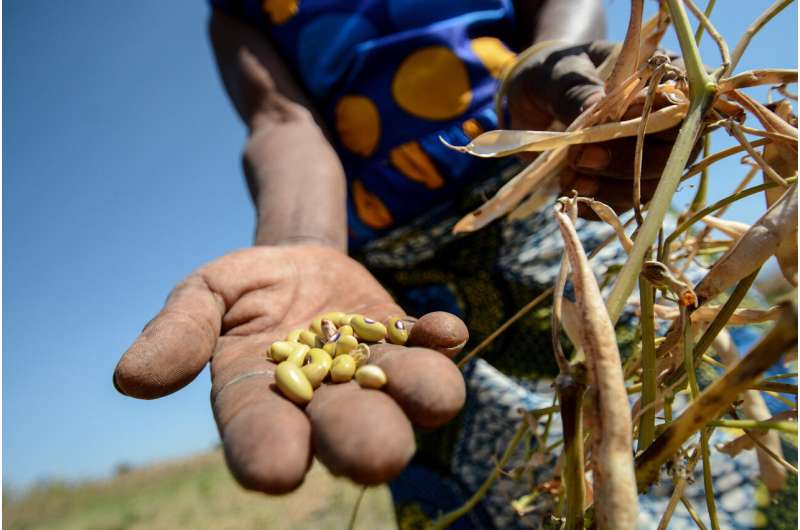COVID-19 pandemic threatens to reverse gains made on Sustainable Development Goal 1 and 2

A new study analyzing bean production and food security across 11 countries in sub-Saharan Africa, found COVID-19 pandemic-related restrictions to significantly impact bean production. Border controls and high transport costs have led to drops in production of the key food security crop, threatening to reverse gains made in achieving Sustainable Development Goals 1 and 2, towards no poverty and zero hunger, respectively.
Even before the pandemic, 55% of the world's hungry people and 70% of the world's poorest people lived in Africa, the researchers said. In addition, food systems across Africa were already affected by the adverse impacts of climate change, disease and pests, such as the worst desert locust outbreak in 70 years impacting food security in Kenya, Somalia, Ethiopia and other countries in eastern Africa.
Other impacts of COVID-19 restrictions, both direct and indirect, can be found in the study: "Regional impact of COVID-19 on the production and food security of common bean smallholder farmers in Sub-Saharan Africa: Implication for SDG's," published in the Global Food Security edition of peer-reviewed platform Science Direct. Direct impacts include farms and food businesses closing down; while indirect impacts are linked to lockdown, border closures, social distancing, and restricted transportation and trade.
"The food system is already highly inefficient. What we've seen is that measures taken to control the virus led to wider food security restrictions and disruptions, exacerbating those already-existing insecurities," said author Eileen Nchanji, a gender researcher at The Alliance of Bioversity International and the International Center for Tropical Agriculture (The Alliance). "Pay cuts, job losses, and high food prices due to reduced food imports and closure of informal markets all disrupted food supplies, with poorer communities especially affected."
From border closures to national lockdowns, delayed cargo further exacerbated food shortages, the researchers said. For instance, 15% of imported food in Kenya before the pandemic was sourced from countries that imposed export restrictions, affecting the availability and flow of crops and food. Restrictions also led to limited access to seed, farm inputs, hired labor, and agricultural finance for smallholder farmers, especially those in Uganda, where planting was beginning.
The data, collected between March and April 2020, shows that most households in Eastern Africa ate only twice during the pandemic. Uganda was most affected, with all surveyed farmers eating only once per day during the pandemic. The research also found a 34% decrease in access to labor attributed to the fear of getting the disease, the high cost of public transportation, and social distancing measures. Farmers also noted difficulties in accessing finance, farm inputs, seed and extension information.
The research highlights that 36%, 20%, and 3% of farmers in Burundi, Uganda, and Kenya respectively lost income during the pandemic, with knock-on impacts on food security. The low number in Kenya is due to the fact that crops were already planted, and farmers were relying on maize and other crops stored from the previous harvest for food and to generate income, while in Uganda and Burundi, planting was ongoing, and so more money was spent on inputs, seed and food, as prices and costs of transport increased.
In West Africa, challenges included insecurity, political instability, social conflicts, and climate change, the report said, citing Food and Agriculture projections that 17 million people in the region will face severe food insecurity following measures to contain the virus.
Although governments across the continent have responded by offering economic stimulus packages, much needs to be done to enable the sub-sector to recover from ruins caused by the pandemic, authors said.
Cosmas Lutomia, at the Kenya Agriculture and Livestock Research Organization (KALRO), said: "The pandemic has necessitated a much needed discussion around the complexity of our food systems. We can only achieve sustainable and resilient food systems through strengthening public-private partnerships. We implore governments across the region to strengthen the food systems' resilience to present and future shocks."
The authors called for an immediate transformation of food systems in all the sub-regions. Governments should invest directly in input supply systems and short food supply chains through digital access, mobile-based payments, credit and food delivery, they added.
More information: Eileen Bogweh Nchanji et al, Regional impact of COVID-19 on the production and food security of common bean smallholder farmers in Sub-Saharan Africa: Implication for SDG's, Global Food Security (2021). DOI: 10.1016/j.gfs.2021.100524
Provided by The Alliance of Bioversity International and the International Center for Tropical Agriculture





















